外国直接投资待遇指南(Guidelines on the Treatment of Foreign Direct Investment)
《国际投资法》练习题
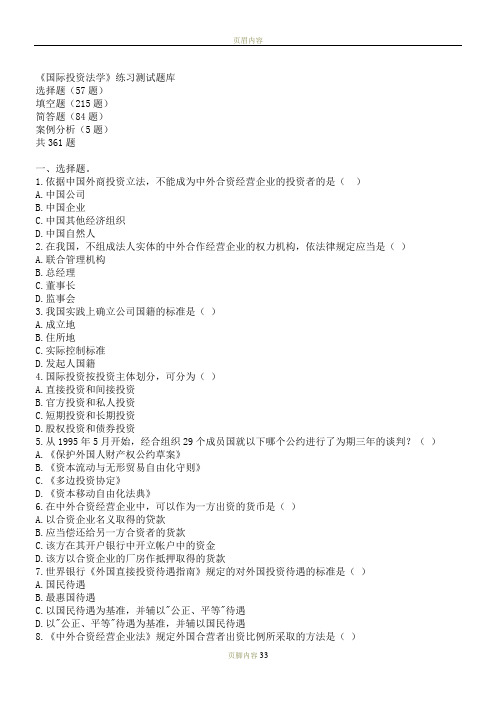
《国际投资法学》练习测试题库选择题(57题)填空题(215题)简答题(84题)案例分析(5题)共361题一、选择题。
1.依据中国外商投资立法,不能成为中外合资经营企业的投资者的是()A.中国公司B.中国企业C.中国其他经济组织D.中国自然人2.在我国,不组成法人实体的中外合作经营企业的权力机构,依法律规定应当是()A.联合管理机构B.总经理C.董事长D.监事会3.我国实践上确立公司国籍的标准是()A.成立地B.住所地C.实际控制标准D.发起人国籍4.国际投资按投资主体划分,可分为()A.直接投资和间接投资B.官方投资和私人投资C.短期投资和长期投资D.股权投资和债券投资5.从1995年5月开始,经合组织29个成员国就以下哪个公约进行了为期三年的谈判?()A.《保护外国人财产权公约草案》B.《资本流动与无形贸易自由化守则》C.《多边投资协定》D.《资本移动自由化法典》6.在中外合资经营企业中,可以作为一方出资的货币是()A.以合资企业名义取得的贷款B.应当偿还给另一方合资者的货款C.该方在其开户银行中开立帐户中的资金D.该方以合资企业的厂房作抵押取得的货款7.世界银行《外国直接投资待遇指南》规定的对外国投资待遇的标准是()A.国民待遇B.最惠国待遇C.以国民待遇为基准,并辅以"公正、平等"待遇D.以"公正、平等"待遇为基准,并辅以国民待遇8.《中外合资经营企业法》规定外国合营者出资比例所采取的方法是()A.上限法B.下限法C.上下限法D.无限法9.特许协议的法律性质是()A.国际性协议B.国内法契约C.准国际条约D.国内法10.在我国《外商投资产业指导目录》中未明文规定的有关外资进入的产业类别是()A.鼓励类B.允许类C.限制类D.禁止类11.在实行对海外私人直接投资政治风险保险制度的国家中,其保险人的身份不尽相同,以政府公司作为保险人的是其中的一种。
现在采用这种作法的典型国家是()A.日本B.德国C.美国D.法国12.发达国家中,外资立法从保守到逐步开放的典型国家是()A.美国B.加拿大C.日本D.澳大利亚13.以下选项中,不属于近年来在国际投资争议的解决中广泛应用的选择性争端解决方式(ADR)的是()A.诉讼B.仲裁C.调解D.微型审理14.某中外合资经营企业的合资双方打算分期缴付出资,但又想尽可能少缴并晚缴第一期出资,根据我国的有关规定,你认为他们在合同中对首期出资的各自认缴出资额的比例和期限应当分别为()A.15%;营业执照签发之日起3个月内B.30%;营业执照签发之日起6个月内C.15%;营业执照签发之日起6个月内D.30%;营业执照签发之日起3个月内15.中外合资经营企业与中外合作企业的不同包括()A.合作企业不具备法人资格B.合作企业不设立董事会C.合作企业的合作方按实际投入分享权益D.合作企业的外商可以先行回收投资16.我国申请设立境外投资企业必须达到的目的包括()A.能赚取外汇B.能带动设备、材料和技术的出口C.能扩大对外承包工程和劳务合作D.能引进先进技术和管理方法E.能较长期稳定地为国内提供需要和短缺的原材料和产品17.在海外投资保险中,一旦保险事故发生,投保者应承担的义务有()A.尽速向承保人通知风险与损失的发生B.预防和减少损失C.保管好有关的一切资产和资料,以便检查和审计D.向承保人转交有关承保投资的资产和权益E.与承保人通力合作,帮助代位索赔18.我国签订的双边投资条约中,规定投资者本人使用的解决东道国与投资者之间争议的办法有()A.通过两国政府间协商或仲裁解决B.当地行政或司法救济C.国际商事仲裁D.通过代位求偿解决E.协商19.在外商投资成片开发土地中,外商是被开发土地的()A.所有人B.投资者C.管理者D.开发人E.招商人20.多边投资担保机构的投资促进业务有()A.研究B.传播信息C.技术咨询和援助D.政策磋商E.谈判21.我国禁止外商投资的项目有()A.危害国家安全或损害社会公共利益的B.占用大量耕地,不利于保护、开发土地资源的C.需要国家统筹规划的产业D.投资额大、回收期长的能源、交通、基础设施建设E.运用中国特有工艺或者技术生产产品22.国家管理境内外国投资的权利包括()A.决定禁止、限制和鼓励外国投资的部门B.投资审查C.管制生产和销售D.外汇管制E.征税23.双边投资协定中对国有化或征收所规定的条件包括()A.必须是出于国家公共利益的考虑B.必须遵守"赫尔规则"C.对外国投资者采取无差别待遇D.对外国投资者予以公正补偿E.必须依一定的法律程序进行24.我国规定外国投资者可采用的投资方式有()A.现金出资B.实物出资C.工业产权出资D.专有技术出资E.债权25.合资经营企业的基本特征是合营双方()A.共同举办B.共同投资C.共同经营管理D.共担风险E.共负盈亏26.(2000年律考单项选择题)在中外合资经营企业中,董事会是按照合营企业的哪一法律文件决定该企业的一切重大问题的?A. 合营企业合同B. 合营企业协议C. 合营企业章程D. 主管机关对合营企业的批准证书27.(2002年司法考试多项选择题)根据《中外合资经营企业法实施条例》,下列事项中那些必须由出席董事会会议的董事一致通过方可做出决议?A.合营企业解散 B. 合营企业注册资本的增加、转让C. 合营企业章程的修改D. 合营企业与其它经济组织的合并28.(2000年律考多项选择题)下列哪些是导致中外合资经营企业解散的情形?A. 企业发生严重亏损无力继续经营B. 合营期限届满C.合营各方协商同意解散 D. 合营企业因严重环境污辱被撤销29.某中外合资公司即将因合营期满而解散。
外商直接投资人民币结算业务管理办法(中英文)
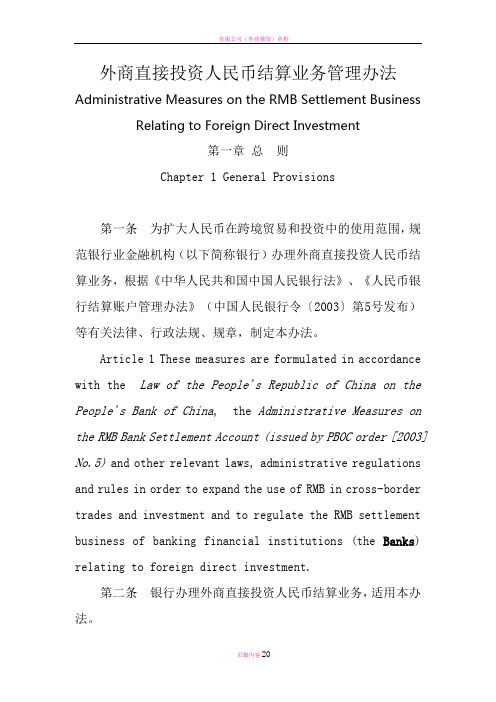
外商直接投资人民币结算业务管理办法Administrative Measures on the RMB Settlement Business Relating to Foreign Direct Investment第一章总则Chapter 1 General Provisions第一条为扩大人民币在跨境贸易和投资中的使用范围,规范银行业金融机构(以下简称银行)办理外商直接投资人民币结算业务,根据《中华人民共和国中国人民银行法》、《人民币银行结算账户管理办法》(中国人民银行令〔2003〕第5号发布)等有关法律、行政法规、规章,制定本办法。
Article 1 These measures are formulated in accordance with the Law of the People's Republic of China on the People's Bank of China, the Administrative Measures on the RMB Bank Settlement Account (issued by PBOC order [2003] No.5)and other relevant laws, administrative regulations and rules in order to expand the use of RMB in cross-border trades and investment and to regulate the RMB settlement business of banking financial institutions (the Banks) relating to foreign direct investment.第二条银行办理外商直接投资人民币结算业务,适用本办法。
Article 2 These measures shall apply to the Banks' RMB settlement business relating to foreign direct investment.第三条境外企业、经济组织或个人(以下统称境外投资者)以人民币来华投资应当遵守中华人民共和国外商直接投资法律规定。
专升本《国际经济法》-试卷-答案
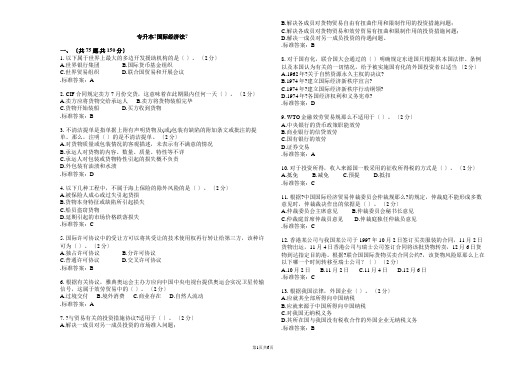
专升本?国际经济法?一、〔共75题,共150分〕1. 以下属于世界上最大的多边开发援助机构的是〔〕。
〔2分〕A.世界银行集团B.国际货币基金组织C.世界贸易组织D.联合国贸易和开展会议.标准答案:A2. CIF合同规定卖方7月份交货,这意味着在此期限内任何一天〔〕。
〔2分〕A.卖方应将货物交给承运人B.卖方将货物装船完毕C.货物开始装船D.买方收到货物.标准答案:B3. 不清洁提单是指单据上附有声明货物及(或)包装有缺陷的附加条文或批注的提单。
那么,注明〔〕的是不清洁提单。
〔2分〕A.对货物质量或包装情况的客观描述,未表示有不满意的情况B.承运人对货物的内容、数量、质量、特性等不详C.承运人对包装或货物特性引起的损失概不负责D.外包装有油渍和水渍.标准答案:D4. 以下几种工程中,不属于海上保险的除外风险的是〔〕。
〔2分〕A.被保险人成心或过失引起货损B.货物本身特征或缺陷所引起损失C.船员盗窃货物D.延期引起的市场价格跌落损失.标准答案:C5. 国际许可协议中的受让方可以将其受让的技术使用权再行转让给第三方,该种许可为〔〕。
〔2分〕A.独占许可协议B.分许可协议C.普通许可协议D.交叉许可协议.标准答案:B6. 根据有关协议,雅典奥运会主办方应向中国中央电视台提供奥运会实况卫星传输信号,这属于效劳贸易中的〔〕。
〔2分〕A.过境交付B.境外消费C.商业存在D.自然人流动.标准答案:A7. ?与贸易有关的投资措施协议?适用于〔〕。
〔2分〕A.解决一成员对另一成员投资的市场准入问题;B.解决各成员对货物贸易自由有扭曲作用和限制作用的投资措施问题;C.解决各成员对货物贸易和效劳贸易有扭曲和限制作用的投资措施问题;D.解决一成员对另一成员投资的待遇问题。
.标准答案:B8. 对于国有化,联合国大会通过的〔〕明确规定东道国只根据其本国法律、条例以及本国认为有关的一切情况,给予被实施国有化的外国投资者以适当〔2分〕A.1962年?关于自然资源永久主权的决议?B.1974年?建立国际经济新秩序宣言?C.1974年?建立国际经济新秩序行动纲领?D.1974年?各国经济权利和义务宪章?.标准答案:D9. WTO金融效劳贸易规那么不适用于〔〕。
外商投资企业直接投资项下外汇业务管理规定及操作规程
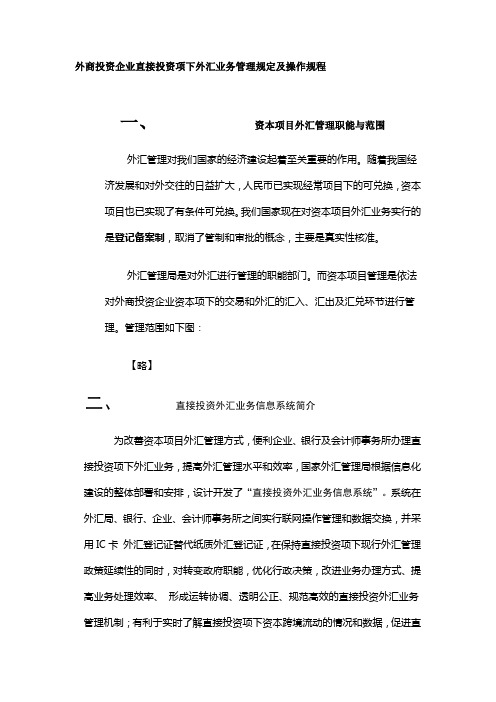
外商投资企业直接投资项下外汇业务管理规定及操作规程一、资本项目外汇管理职能与范围外汇管理对我们国家的经济建设起着至关重要的作用。
随着我国经济发展和对外交往的日益扩大,人民币已实现经常项目下的可兑换,资本项目也已实现了有条件可兑换。
我们国家现在对资本项目外汇业务实行的是登记备案制,取消了管制和审批的概念,主要是真实性核准。
外汇管理局是对外汇进行管理的职能部门。
而资本项目管理是依法对外商投资企业资本项下的交易和外汇的汇入、汇出及汇兑环节进行管理。
管理范围如下图:【略】二、直接投资外汇业务信息系统简介为改善资本项目外汇管理方式,便利企业、银行及会计师事务所办理直接投资项下外汇业务,提高外汇管理水平和效率,国家外汇管理局根据信息化建设的整体部署和安排,设计开发了“直接投资外汇业务信息系统”。
系统在外汇局、银行、企业、会计师事务所之间实行联网操作管理和数据交换,并采用IC卡外汇登记证替代纸质外汇登记证,在保持直接投资项下现行外汇管理政策延续性的同时,对转变政府职能,优化行政决策,改进业务办理方式、提高业务处理效率、形成运转协调、透明公正、规范高效的直接投资外汇业务管理机制;有利于实时了解直接投资项下资本跨境流动的情况和数据,促进直接投资外汇业务信息流通和资源共享;有利于提高各方主体的办事效率、合作意识和规范程度,促进社会诚信体系建设。
目前外汇局同银行已实行联网操作管理并于2008年5月1日正式在全国范围内推广上线,启用IC卡外汇登记证。
我分局及辖内各支局在总局统一要求和部署下,利用今年四月份外商投资企业联合年检时机对企业、银行、会计师事务所进行广泛宣传与培训,历时四个月时间将全省近1300家既存企业信息进行数据采集、审核,电子化后录入系统,企业据此向所在地外汇局换领IC 卡外汇登记证。
从2008年8月1日起,外汇局办理业务停止使用纸质外汇登记证,企业一律持IC卡外汇登记证到外汇局及外汇指定银行办理各项外汇业务。
国际投资法

直接投资与间接投资的区别:对企业有无控制权 对企业有无控制权。 对企业有无控制权 由于控制权常与股权联系在一起,因此拥有多少股 权才是控制,并因而构成直接投资,各国立法解释 不一。美国《1976年国际投资调查法》规定:直接 投资是指个人直接或间接拥有或控制一定工商公司 10% 10%有表决权并能代表公司资本的股份(证券) 参阅余劲松《国际投资法》P1
(二)发展中国家的外资立法 1、大多数国家对外资进入设有审批规定; 2、与发达国家相比,对外资鼓励较多,限制也较多; 3、从限制走向逐步开放。
第四节 资本输出国海外投资法 一、资本输出国(投资母国)关于海外投资的法制 较为分散,没有一部统一的法律。 由于私人海外投资对其本国经济有利,如巨额海外 利润汇回,有助于增加国家的财政收入;有利于开拓 国外市场;利用本国经济、技术上的优势来加强国际 竞争力。因此,各国都鼓励海外投资。 二、鼓励与保护措施 1)税收。①税收抵免:在东道国已缴纳的税款, 可在本国报税时从应纳税额中加以扣减。许多国家 都有此规定。如美国《国内收入法》允许纳税人从 其在美国的应纳税款中扣除外国对该海外企业已征 的税款。许多国家还通过签订避免双重征税的双边 协定实行税收抵免 。
二、国际投资法 国际投资法:调整跨国(国际间)私人直接投 国际投资法 资关系的有关国内法和国际法规范的总称。 1、渊源 渊源:国内法与国际法渊源 渊源 ⑴ 国内立法: ①资本输入国的外国投资法; ②资本输出国的海外投资法。 ⑵国际条约: ①双边条约; ②多边公约(区域性、世界性)。关于国际投 资的世界性多边公约目前有:《解决国家与他国 国民间投资争端公约》(1966) 、《多边投资担 保机构公约》(1988 )、《与贸易有关的投资措 施协定》(1994)。国ຫໍສະໝຸດ 经济法学叶才勇
国际法上对间接征收的界定
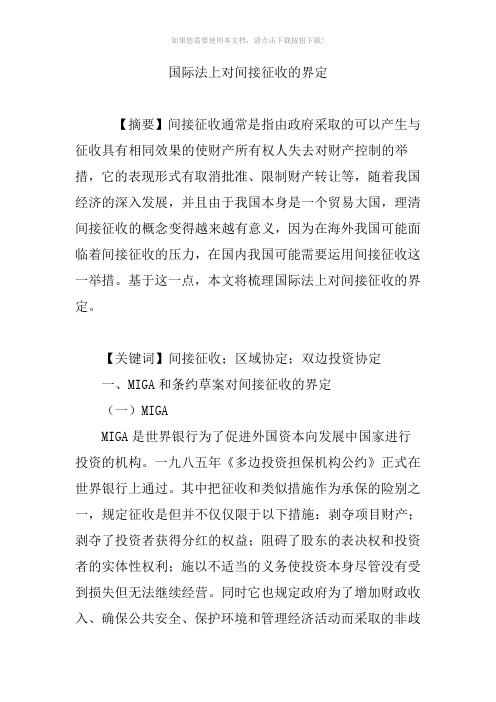
国际法上对间接征收的界定【摘要】间接征收通常是指由政府采取的可以产生与征收具有相同效果的使财产所有权人失去对财产控制的举措,它的表现形式有取消批准、限制财产转让等,随着我国经济的深入发展,并且由于我国本身是一个贸易大国,理清间接征收的概念变得越来越有意义,因为在海外我国可能面临着间接征收的压力,在国内我国可能需要运用间接征收这一举措。
基于这一点,本文将梳理国际法上对间接征收的界定。
【关键词】间接征收;区域协定;双边投资协定一、MIGA和条约草案对间接征收的界定(一)MIGAMIGA是世界银行为了促进外国资本向发展中国家进行投资的机构。
一九八五年《多边投资担保机构公约》正式在世界银行上通过。
其中把征收和类似措施作为承保的险别之一,规定征收是但并不仅仅限于以下措施:剥夺项目财产;剥夺了投资者获得分红的权益;阻碍了股东的表决权和投资者的实体性权利;施以不适当的义务使投资本身尽管没有受到损失但无法继续经营。
同时它也规定政府为了增加财政收入、确保公共安全、保护环境和管理经济活动而采取的非歧视的普遍的措施不是征收。
由此可见MIGA具有广泛的影响力,它对于间接征收做出了详实的规定,它的但书说明了政府采取的具有广泛的、普遍性的措施不是间接征收。
(二)条约草案一九六一年的《侵害外国人的国际责任公约哈佛草案》规定对所有权人的财产的处分、收益、和使用进行不合理的干涉从而导致所有权人不能行使上述全能就是间接征收。
然而《侵害外国人的国际责任公约哈佛草案》在第五款也规定了一些例外情形,也就是说当一国基于落实税法的规定、行使正当的交战权、正常的货币价值变化或者为了维护公共秩序而采取措施以及其他符合国内法的正当行为而对外国人的财产进行剥夺或征收是合法的。
同时该文件还认为在一个合理的期限内只是基于政府的临时措施而造成财产权的无法使用不是征收。
世界银行的《外国直接投资待遇指南》和《联合国跨国公司行动守则》对这一问题规定的较为模糊和简单。
[精选]直接投资业务外汇政策
![[精选]直接投资业务外汇政策](https://img.taocdn.com/s3/m/62185598fc0a79563c1ec5da50e2524de518d0ae.png)
ODI企业其他重要事项境内机构境外放款登记暂未下放特殊目的公司/返程投资管理(详见操作指引)特殊目的公司项下境内个人购付汇严格按照外汇局相应核准件要求办理SPV公司外汇登记的一个底线,两个原则1、一个底线:境内居民个人拟以境内资产或者权益出资的,必须合法拥有境内企业2、两个判断SPV补登记的原则:向境外SPV公司注资后(含境外出资)登记,支付特殊目的公司注册费用除外;境内企业成立时间晚于境外SPV企业成立时间SPV企业的补登记必须由外管局办理,银行不得办理。
要点解读:取消直接投资外汇年检,改为实行境内直接投资和境外直接投资存量权益登记:解读:相关市场主体应于每年9月30日(含)前,自行或委托会计师事务所、银行通过外汇局资本项目信息系统报送上年末境内直接投资和(或)境外直接投资存量权益(以下合称直接投资存量权益)数据。对于未按前款规定办理的相关市场主体,外汇局在资本项目信息系统中对其进行业务管控,银行不得为其办理资本项下外汇业务。在按要求补报并向外汇局出具说明函说明合理理由后,外汇局取消业务管控,对涉嫌违反外汇管理规定的,依法进行行政处罚。
要点解读:简化境内直接投资项下外国投资者出资确认登记管理:解读:非货币形式出资的,资本项目信息系统自动完成外方出资确认登记,不再需要通过会计师事务所或企业办理出资确认登记。境内外汇入的货币资金(含跨境人民币)出资的,由银行通过资本项目信息系统办理出资入账登记,办理入账登记后的资本金方可使用。
要点解读:取消境外再投资外汇备案解读:13号文进一步明确境外投资企业在境外投资设立的子公司、孙公司等不再实行备案管理
主要内容:取消直接投资外汇登记核准简化境内直接投资项下外国投资者出资确认登记管理取消境外再投资外汇备案取消直接投资外汇年检加强事中事后监管
要点解读:取消境内直接投资及境外直接投资外汇登记与核准(直接投资外汇登记下放银行办理)解读:1)普惠原则:已经取得外汇局金融机构标识码且在所在地外汇局开通资本项目信息系统的银行,都可以在所在地外汇局的指导下开展直接投资外汇登记等相关业务。2)市场主体遵循“属地办理”原则和 “先登记后汇兑”原则,相关市场主体可自行选择注册地银行办理直接投资外汇登记,完成直接投资外汇登记后,方可办理后续直接投资相关账户开立、资金汇兑等业务。
外商直接投资人民币结算业务管理办法(中英文)

外商直接投资人民币结算业务管理办法Administrative Measures on the RMB Settlement Business Relating to Foreign Direct Investment第一章总则Chapter 1 General Provisions第一条为扩大人民币在跨境贸易和投资中的使用范围,规范银行业金融机构(以下简称银行)办理外商直接投资人民币结算业务,根据《中华人民共和国中国人民银行法》、《人民币银行结算账户管理办法》(中国人民银行令〔2003〕第5号发布)等有关法律、行政法规、规章,制定本办法。
Article 1 These measures are formulated in accordance with the Law of the People's Republic of China on the People’s Bank of China, the Administrative Measures on the RMB Bank Settlement Account (issued by PBOC order [2003]No。
5) and other relevant laws,administrative regulations and rules in order to expand the use of RMB in cross—border trades and investment and to regulate the RMB settlement business of banking financial institutions (the Banks)relating to foreign direct investment.第二条银行办理外商直接投资人民币结算业务,适用本办法。
Article 2 These measures shall apply to the Banks' RMB settlement business relating to foreign direct investment。
整理框架合同与非框架合同
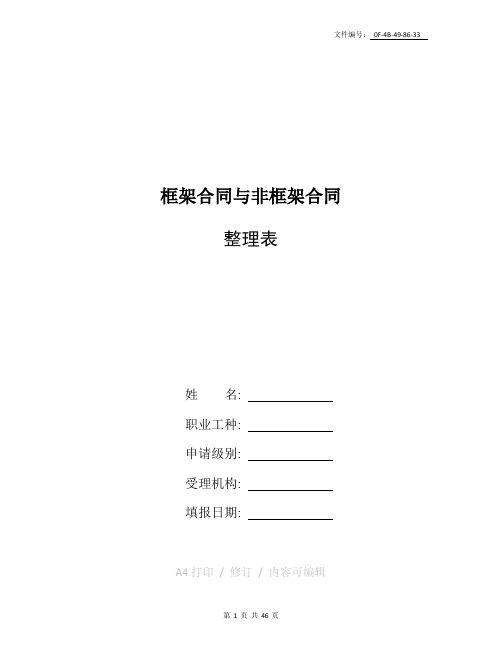
框架合同与非框架合同整理表姓名:职业工种:申请级别:受理机构:填报日期:A4打印/ 修订/ 内容可编辑第八讲投资措施与贸易乌拉圭回合达成的与投资有关的投资措施协议标志着原本属于东道国国内管辖的内容开始受到多边纪律的约束,这是以美国为首的发达国家一手导演的。
虽然规范国际投资的法律仍然主要以国内法以及众多的双边投资协定为主,与贸易有关的投资措施协议只是针对与贸易有关的投资措施,值得注意的是,虽然OCED的多边投资协议(MAI)流产了,但是建立多边投资协定的努力一直没有放弃。
WTO第四次部长会议宣言中提出,要建立一个多边投资框架,以保证透明、稳定和可预测的环境,为扩大贸易的长期与跨国投资,尤其是外国直接投资服务。
多边投资框架谈判将会在第五次部长会议和启动。
WTO正积极与联合国贸发会议合作来探讨这一问题。
第一节投资体系概述一、国际投资协调第二次世界大战以后,尤其是70年代以来,以跨国公司为主体的国际直接投资活动日趋频繁,年直接投资数额和直接投资累积存量不断扩大,直接投资对各国经济和国际贸易产生了重要的影响。
与此同时,投资国和东道国以及投资者和东道国之间围绕着直接投资方面的矛盾与纠纷也不断增多。
为了减少和克服矛盾与纠纷,为了促进国际投资活动的健康发展和积极作用的更大发挥,迫切需要加强国际协调与合作。
为此,国际社会在近几十年间曾做出了多方面的努力,起草或制定了一些规则和协议。
这些规则和协议有的实施了,有的并未付诸实施。
从70年代开始,在联合国经社理事会所属的原跨国公司委员会的组织下,开始起草《联合国跨国公司行为守则》,于80年代初提出草案。
该《守则》草案的内容分为6章,它们分别是:序言和目标;跨国公司的定义和《守则》的适用范围;跨国公司的活动及其对东道国的态度;跨国公司的待遇;各国政府为实施《守则》而合作;各国和国际上为实施《守则》所应采取的行动。
《守则》草案提出后,进行了多次讨论和修改,但由于发达国家与发展中国家在跨国公司受东道国法律管辖、征收与国有化的赔偿标准、投资者与东道国政府争议的解决以及外汇汇出的限制等问题上存在分歧,致使有关谈判久拖未结。
海外对外直接投资财税支持政策简介
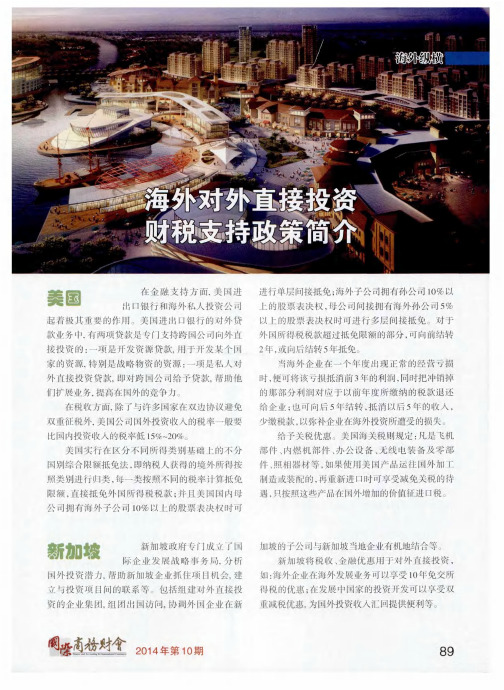
制度一方面缓和 了亏损对企业持续经营的冲击 , 帮
方 面 可 从 整体 上 减 轻 企业 税 负 , 隐性 地 提 升 了 F D I
所得 的水 平 。
3 . 延迟 纳税 与 CF C法 规
额, 减轻境外投资企业税负。②税收饶让抵免 。在 助企业摆脱困境 , 走 出亏损 , 走 向持平或盈余 : 另一
法 国 使 用 免 1 . 海 税 外 法 子 来 公 消 司 除 的 国 股 际 息 双 免 重 税 征 税 得税 三 分 之一 的情 况 , 必 须将 其 子公 司 的财 务 纳入
是法 国对外投资税收政策 的特色 。1 9 6 5 年, 法国政
府 颁 布法 律 规 定 任 何 一 家法 国公 司在 外 国公 司 持 有l 0 % 以上 的 资本 , 即视 为母 公 司 , 其 持 股 的公 司 为子 公 司 , 国外 子公 司分 配给母 公 司 的股 息不 计 入 母 公 司应 纳税 的所得 范 围。法 国认 为 , 对对 外 投 资
日本 不 同 之 1 . 对 处 外 直 接 投 资 税 收 抵 免 其 损 , 则 可 从 准备 金得 到 补偿 ; 若 未损 失 , 该 部分 金 额
① 综 合 限额 的计 算 。 日本 则 采 用排 除 亏损 国 在外 的综 合 限额抵 免 , 做法 是 , 在计 算综 合抵 免 限额 时 允许 将 亏损 国的亏 损额 除 外 , 这样 可增 大 抵 免 限
分 股 息适 用外 国税 收抵免 , 从 国 内股 东 的法 人 税 中 抵扣 。 ( 作者: 李敏 )
准备金的设立使企业 和政府共 同承担海外经
的兴 趣 和动 力 。核 心 内容 为 : 满 足一 定条 件 的对 外 直 接投 资 , 将 投 资 的一 定 比例 ( 如 特定 海 外 工 程 经 营 管理 费用 的 7 %, 大 规模 经 济合 作 和 合 资 事 业 投
FDI国民待遇标准若干问题探析
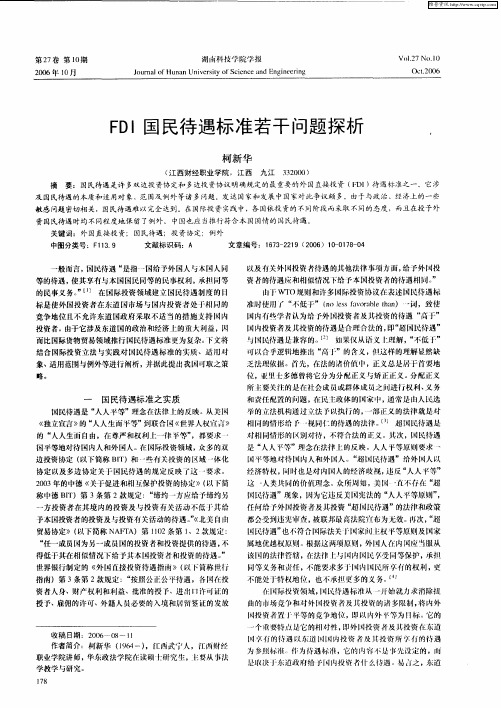
及国民待遇的本质和适 用对 象、范围及例外等诸多 问 。 达国家和发展 中国家对此争议 颇多 由于与政 治、经济上的一些 题 发 敏感问题 密切相关 ,国民待遇难 以完全达到。在 国际投 资实践 中,各国依投 资的 不同阶段而采取 不同的态度 ,而且在授予外 资 国民待遇时均不 同 度地保 留了例外 中国也应 当 程 推行符合本 国国情的国民待遇 。
V O .7 N【. ( 12 )1) 0ct7x】 -【 6
F 国民待遇标准若干 问题探析 D I
柯新华
( 西 财 经职 业 学 院 ,江 西 江 九江 32 0 ) 3 0 0
摘 要:国民待遇是许 多双边投 资协 定和多边投资协议 明确规定 的最 重要的外国直接投 资 ( 1 待 遇标 之 一。它涉 R) ) 住
20 0 3年的中德 关于促进 和丰I 【 互保护投 资的协定 ( F 以 简
对棚 同情形 的 别对待 ,不符 合法 的正义。其次 ,囡民待遇
足 “ 人人平等”理念 在法律 上的反映 。人人 平等原则要求 ‘ 国 等地对待 l q内人和外 国人 。“ 超 民待遇”给外旧人以 经 济特权 , 时也足对 内同人的经济歧视 , 违反 “ 人人 、 F等”
方投资者在其境 内的投 资及 与投 资有关活动不低下其 给
予本国投资者的投 资及 l投 资有关活动的待遇 。 卜 j ” 北荚 自由
贸易协定 ( 以下简称 N F )第 10 AF A 12条第 1 、2款规定 : “ 任一成员因为另一成 员国的投资 者和投资提供的待遇 , 不
属地 优越 卡原则 。 义 根据这两项原则 , 外 人扯 内冈应当服从 该同的法律篱辖 ,在法律 f = 与 内喇比 受同等保 护 , 承担
商务部海外投资保险简介及操作流程
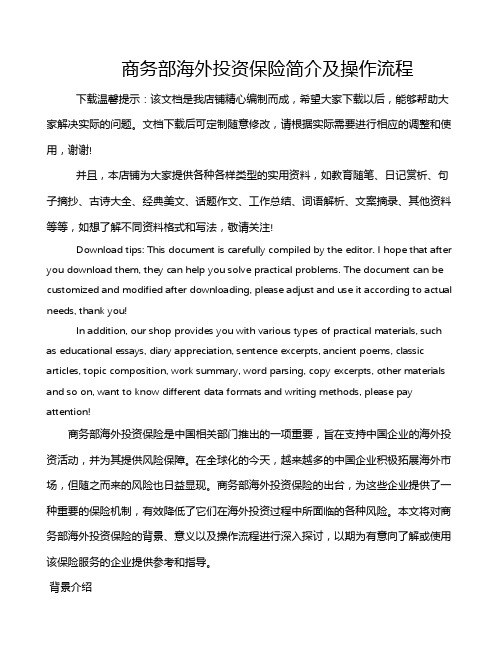
商务部海外投资保险简介及操作流程下载温馨提示:该文档是我店铺精心编制而成,希望大家下载以后,能够帮助大家解决实际的问题。
文档下载后可定制随意修改,请根据实际需要进行相应的调整和使用,谢谢!并且,本店铺为大家提供各种各样类型的实用资料,如教育随笔、日记赏析、句子摘抄、古诗大全、经典美文、话题作文、工作总结、词语解析、文案摘录、其他资料等等,如想了解不同资料格式和写法,敬请关注!Download tips: This document is carefully compiled by the editor. I hope that after you download them, they can help you solve practical problems. The document can be customized and modified after downloading, please adjust and use it according to actual needs, thank you!In addition, our shop provides you with various types of practical materials, such as educational essays, diary appreciation, sentence excerpts, ancient poems, classic articles, topic composition, work summary, word parsing, copy excerpts, other materials and so on, want to know different data formats and writing methods, please pay attention!商务部海外投资保险是中国相关部门推出的一项重要,旨在支持中国企业的海外投资活动,并为其提供风险保障。
境外直接投资外汇业务展业规范
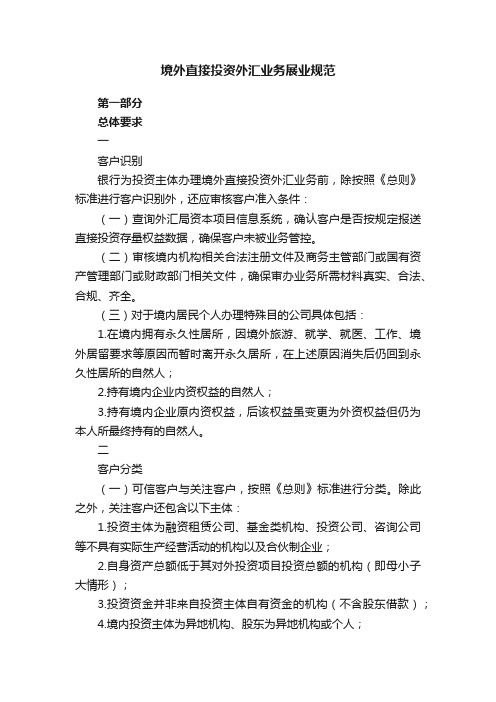
境外直接投资外汇业务展业规范第一部分总体要求一客户识别银行为投资主体办理境外直接投资外汇业务前,除按照《总则》标准进行客户识别外,还应审核客户准入条件:(一)查询外汇局资本项目信息系统,确认客户是否按规定报送直接投资存量权益数据,确保客户未被业务管控。
(二)审核境内机构相关合法注册文件及商务主管部门或国有资产管理部门或财政部门相关文件,确保审办业务所需材料真实、合法、合规、齐全。
(三)对于境内居民个人办理特殊目的公司具体包括:1.在境内拥有永久性居所,因境外旅游、就学、就医、工作、境外居留要求等原因而暂时离开永久居所,在上述原因消失后仍回到永久性居所的自然人;2.持有境内企业内资权益的自然人;3.持有境内企业原内资权益,后该权益虽变更为外资权益但仍为本人所最终持有的自然人。
二客户分类(一)可信客户与关注客户,按照《总则》标准进行分类。
除此之外,关注客户还包含以下主体:1.投资主体为融资租赁公司、基金类机构、投资公司、咨询公司等不具有实际生产经营活动的机构以及合伙制企业;2.自身资产总额低于其对外投资项目投资总额的机构(即母小子大情形);3.投资资金并非来自投资主体自有资金的机构(不含股东借款);4.境内投资主体为异地机构、股东为异地机构或个人;5.境内投资主体成立时间不超过1年或短期内集中办理境外直接投资登记业务的机构;6.境外投资项目与境内投资主体主营业务差异较大的机构;7.企业负责人、主要股东、总经理等高管人员被纳入个人结售汇关注名单的机构;8.其他银行认定的关注客户。
(二)银行应按照《总则》要求,进行客户背景调查,综合考虑客户或实际控制人身份、地域、行业、特点、历史交易等因素,合理划分客户风险等级,对于关注客户办理境外直接投资业务适用更加严格的尽职调查和业务审批程序。
三业务审核(一)银行办理境外直接投资外汇业务,应尽职审查客户资料,全面了解业务背景,确保客户申请办理业务背景真实、交易目的清楚合理、资金来源合法合规,确保境外投资项目经主管部门批准。
海外对外直接投资财税支持政策简介

2014年第10期在金融支持方面,美国进出口银行和海外私人投资公司起着极其重要的作用。
美国进出口银行的对外贷款业务中,有两项贷款是专门支持跨国公司向外直接投资的:一项是开发资源贷款,用于开发某个国家的资源,特别是战略物资的资源:一项是私人对外直接投资贷款,即对跨国公司给予贷款,帮助他们扩展业务,提高在国外的竞争力。
在税收方面,除了与许多国家在双边协议避免双重征税外,美国公司国外投资收入的税率一般要比国内投资收入的税率低15%~20%。
美国实行在区分不同所得类别基础上的不分国别综合限额抵免法,即纳税人获得的境外所得按照类别进行归类,每一类按照不同的税率计算抵免限额,直接抵免外国所得税税款;并且美国国内母公司拥有海外子公司10%以上的股票表决权时可进行单层间接抵免;海外子公司拥有孙公司10%以上的股票表决权,母公司间接拥有海外孙公司5%以上的股票表决权时可进行多层间接抵免。
对于外国所得税税款超过抵免限额的部分,可向前结转2年,或向后结转5年抵免。
当海外企业在一个年度出现正常的经营亏损时,便可将该亏损抵消前3年的利润,同时把冲销掉的那部分利润对应于以前年度所缴纳的税款退还给企业;也可向后5年结转,抵消以后5年的收入,少缴税款,以弥补企业在海外投资所遭受的损失。
给予关税优惠。
美国海关税则规定:凡是飞机部件、内燃机部件、办公设备、无线电装备及零部件、照相器材等,如果使用美国产品运往国外加工制造或装配的,再重新进口时可享受减免关税的待遇,只按照这些产品在国外增加的价值征进口税。
新加坡政府专门成立了国际企业发展战略事务局,分析国外投资潜力,帮助新加坡企业抓住项目机会,建立与投资项目间的联系等。
包括组建对外直接投资的企业集团,组团出国访问,协调外国企业在新加坡的子公司与新加坡当地企业有机地结合等。
新加坡将税收、金融优惠用于对外直接投资,如:海外企业在海外发展业务可以享受10年免交所得税的优惠;在发展中国家的投资开发可以享受双重减税优惠,为国外投资收入汇回提供便利等。
英文)关于外国直接投资在越南进行药品,美容,个体医疗服务活动的法规和手续总则幻灯片

I. LEGAL FRAMEWORK (continued)
II. 2. Laws & Regulations for pharmaceutical, cosmetic and health care projects
III. Agreement on the ASEAN Harmonized Cosmetic Regulatory Scheme
IV. Law on Medical Examination an. Law on Product and Goods Quality
VII. Decree No. 79/2006/ND-CP of the Government detailing and guiding the implementation of a number of articles of Law on Pharmacy
VIII. Decree No. 132/2021/ND-CP of the Government detailing the implementation of a number of articles of the Law on product and goods quality
IX. Circular No. 02/2007/TT-BYT of the Ministry of Health guiding in detail the implementation of a number of articles on drug-dealing conditions prescribed by the Pharmacy Law and the Government's Decree No. 79/2006/ND-CP dated August 9, 2006, detailing the implementation of a number of articles of the Pharmacy Law
- 1、下载文档前请自行甄别文档内容的完整性,平台不提供额外的编辑、内容补充、找答案等附加服务。
- 2、"仅部分预览"的文档,不可在线预览部分如存在完整性等问题,可反馈申请退款(可完整预览的文档不适用该条件!)。
- 3、如文档侵犯您的权益,请联系客服反馈,我们会尽快为您处理(人工客服工作时间:9:00-18:30)。
World BankGuidelines on the Treatmentof Foreign Direct InvestmentThe Development CommitteeRecognizingthat a greater flow of foreign direct investment brings substantial benefits to bear on the world economy and on the economies of developing countries in particular, in terms of improving the long term efficiency of the host country through greater competition, transfer of capital, technology and managerial skills and enhancement of market access and in terms of the expansion of international trade;that the promotion of private foreign investment is a common purpose of the International Bank for Reconstruction and Development, the International Finance Corporation and the Multilateral Investment Guarantee Agency;that these institutions have pursued this common objective through their operations, advisory services and research;that at the request of the Development Committee, a working group established by the President of these institutions and consisting of their respective General Counsel has,after reviewing existing legal instruments and literature, as well as best available practice identified by these institutions, prepared a set of guidelines representing a desirable overall framework which embodies essential principles meant to promote foreign direct investment in the common interest of all members;that these guidelines, which have benefitted from a process of broad consultation inside and outside these institutions, constitute a further step in the evolutionary process where several international efforts aim to establish a favorable investment environment free from non-commercial risks in all countries, and thereby foster the confidence of international investors; andthat these guidelines are not ultimate standards but an important step in the evolution of generally acceptable international standards which complement,but do not substitute for,bilateral investment treaties,therefore calls the attention of member countries to the following Guidelines as useful parameters in the admission and treatment of private foreign investment in their territories, without prejudice to the binding rules of international law at this stage of its development.ISCOPE OF APPLICATION1. These Guidelines may be applied by members of the World Bank Group institutions to private foreign investment in their respective territories, as a complement to applicable bilateral and multilateral treaties and other international instruments, to the extent that these Guidelines do not conflict with such treaties and binding instruments, and as a possible source on which national legislation governing the treatment ofprivate foreign investment may draw. Reference to the "State" in these Guidelines, unless the context otherwise indicates, includes the State or any constituent subdivision, agency or instrumen tality of the State and reference to "nationals" includes natural and juridical persons who enjoy the nationality of the State.2. The application of these Guidelines extends to existing and new investments established and operating at all times as bona fide private foreign investments, in full conformity with the laws and regulations of the host State.3.These Guidelines are based on the general premise that equal treatment of investors in similar circumstances and free competition among them are prerequisites of a positive investment environment. Nothing in these Guidelines therefore suggests that foreign investors should receive a privileged treatment denied to national investors in similar circumstances.IIADMISSION1. Each State will encourage nationals of other States to invest capital, technology and managerial skill in is territory and, to that end, is expected to admit such investments in accordance with the following provisions.2. In furtherance of the foregoing principle, each State will:(a) facilitate the admission and establishment of investments by nationals of other States, and(b) avoid making unduly cumbersome or complicated procedural regulations for, or imposingunnecessary conditions on, the admission of such investments.3.Each State maintains the right to make regulations to govern the admission of private foreign investments. In the formulation and application of such regulations, States will note that experience suggests that certain performance requirements introduced as conditions of admission are often counterproductive and that open admission, possibly subject to a restricted list of investments (which are either prohibited or require screening and licensing), is a more effective approach. Such performance requirements often discourage foreign investors from initiating investment in the State concerned or encourage evasion and corruption. Under the restricted list approach, investments in nonlisted activities, which proceed without approval, remain subject to the laws and regulations applicable to investments in the State concerned.4. Without prejudice to the general approach of free admission recommended in Section 3 above, a State may, as an exception, refuse admission to a proposed investment:(i)which is, in the considered opinion of the State, inconsistent with clearly definedrequirements of national security; or(ii)which belongs to sectors reserved by the law of the State to its nationals on account of the State's economic development objectives or the strict exigencies of its nationalinterest.5. Restrictions applicable to national investment on account of public policy (ordre public), public health and the protection of the environment will equally apply to foreign investment.6. Each State is encouraged to publish, in the form of a handbook or other medium easily accessible to other States and their investors,adequate and regularly updated information about its legislation, regulations and procedures relevant to foreign investment and other information relating to its investment policies including, inter alta, an indication of any classes of investment which it regards as falling under Sections 4 and 5 of this Guideline.IIITREATMENT1. For the promotion of international economic cooperation through the medium of private foreign investment,the establishment,operation,management,control,and exercise of rights in such an investment, as well as such other associated activities necessary therefor or incidental thereto, will be consistent with the following standards which are meant to apply simultaneously to all States without prejudice to the provisions of applicable international instruments, and to firmly established rules of customary international law.2. Each State will extend to investments established in its territory by nationals of any other State fair and equitable treatment according to the standards recommended in these Guidelines.3. (a) With respect to the protection and security of their person, property rights and interests, and to the granting of permits, import and export licenses and the authorization to employ, and the issuance of the necessary entry and stay visas to their foreign personnel, and other legal matters relevant to the treatment of foreign investors as described in Section 1 above, such treatment will, subject to the requirement of fair and equitable treatment mentioned above, be as favorable as that accorded by the State to national investors in similar circumstances. In all cases, full protection and security will be accorded to the investor's rights regarding ownership,control and substantial benefits over his property,including intellectual property.(b) As concerns such other matters as are not relevant to national investors, treatment under the State's legislation and regulations will not discriminate among foreign investors on grounds of nationality.4. Nothing in this Guideline will automatically entitle nationals of other States to the more favorablestandards of treatment accorded to the nationals of certain States under any customs union or free trade area agreement.5. Without restricting the generality of the foregoing, each State will:(a) promptly issue such licenses and permits and grant such concessions as may be necessary forthe uninterrupted operation of the admitted investment; and(b) to the extent necessary for the efficient operation of the investment, authorize the employment of foreign personnel. While a State may require the foreign investor to reasonably establish his inability to recruit the required personnel locally, e.g., through local advertisement, before he resorts to the recruitment of foreign personnel, labor market flexibility in this and other areas is recognized as an important element in a positive investment environment. Of particular importance in this respect is the investor's freedom to employ top managers regardless of their nationality.6. (1) Each State will, with respect to private investment in its territory by nationals of the other States:(a) freely allow regular periodic transfer of a reasonable part of the salaries and wages offoreign personnel; and, on liquidation of the investment or earlier termination of theemployment, allow immediate transfer of all savings from such salaries and wages;(b) freely allow transfer of the net revenues realized from the investment;(c) allow the transfer of such sums as may be necessary for the payment of debts contracted, or the discharge of other contractual obligations incurred in connection with the investment as they fall due;(d) on liquidation or sale of the investment (whether covering the investment as a whole or a partthereof), allow the repatriation and transfer of the net proceeds of such liquidation or sale andall accretions thereto all at once; in the exceptional cases where the State faces foreignexchange stringencies, such transfer may as an exception be made in installments within aperiod which will be as short as possible and will not in any case exceed five years from thedate of liquidation or sale, subject to interest as provided for in Section 6 (3) of this Guideline;and(e) allow the transfer of any other amounts to which the investor is entitled such as those whichbecome due under thc conditions provided for in Guidelines IV and V.(2) Such transfer as provided for in Section 6 (1) of this Guideline will be made (a) in the currency brought in by the investor where it remains convertible, in another currency designated as freely usable currency by the International Monetary Fund or in any other currency accepted by the investor, and (b) at the applicable market rate of exchange at the time of the transfer.(3) In the case of transfers under Section 6 (1) of this Guideline, and without prejudice to Sections 7 and 8 of Guideline IV where they apply, any delay in effecting the transfers to be made through the central bank (or another authorized public authority) of the host State will be subject to interest at the normal rate applicable to the local currency involved in respect of any period intervening between the date on which such local currency has been provided to the central bank (or the other authorized public authority) for transfer and the date on which the transfer is actually effected.(4) The provisions set forth in this Guideline with regard to the transfer of capital will also apply to the transfer of any compensation for loss due to war, armed conflict, revolution or insurrection to the extent that such compensation may be due to the investor under applicable law.7. Each State will permit and facilitate the reinvestment in its terri tory of the profits realized from existing investments and the proceeds of sale or liquidation of such investments.8. Each State will take appropriate measures for the prevention and control of corrupt business practices and the promotion of accountability and transparency in its dealings with foreign investors, and will cooperate with other States in developing international procedures and mechanisms to ensure thc same.9. Nothing in this Guideline suggests that a State should provide foreign investors with tax exemptions or other fiscal incentives. Where such incentives are deemed to be justified by the State, they may to the extent possible be automatically granted, directly linked to the type of activity to be encouraged and equally extended to national investors in similar circumstances. Competition among States in pro viding such incentives, especially tax exemptions, is not recommended. Reasonable and stable tax rates are deemed to provide a better incentive than exemptions followed by uncertain or excessive rates.10. Developed and capital surplus States will not obstruct flows of investment from their territories to developing States and are encouraged to adopt appropriate measures to facilitate such flows, including taxation agreements, investment guarantees, technical assistance and the provision of information. Fiscal incentives provided by some investors'governments for the purpose of encouraging investment in developing States are recognized in particular as a possibly effective element in promoting such investment.IVEXPROPRIATION AND UNILATERAL ALTERATIONSOR TERMINATION OF CONTRACTS1. A State may not expropriate or otherwise take in whole or in part a foreign private investment in its territory, or take measures which have similar effects, except where this is done in accordance with ap-plicable legal procedures, in pursuance in good faith of a public purpose, without discrimination on the basis of nationality and against the payment of appropriate compensation.2. Compensation for a specific investment taken by the State will, according to the details provided below, be deemed "appropriate" if it is adequate, effective and prompt.3. Compensation will be deemed "adequate" if it is based on the fair market value of the taken asset as such value is determined immediately before the time at which the taking occurred or the decision to take the asset became publicly known.4. Determination of the “fair market value" will be acceptable if conducted according to a method agreed by the State and the foreign investor (hereinafter referred to as the parties) or by a tribunal or another body designated by the parties.5. In the absence of a determination on agreed by, or based on the agreement of, the parties, the fair market value will be acceptable if determined by the State according to reasonable criteria related to the market value of the investment, i.e., in an amount that a willing buyer would normally pay to a willing seller after taking into account the nature of the investment, the circumstances in which it would operate in the future and its specific characteristics, including the period in which it has been in existence, the proportion of tangible assets in the total investment and other relevant factors pertinent to the specific circumstances of each case.6. Without implying the exclusive validity of a single standard for the fairness by which compensation is to be determined and as an illustration of the reasonable determination by a State of the market value o f the investment under Section 5 above, such determination will be deemed reasonable if conducted as follows:(i) for a going concern with a proven record of profitabil ity, on the basis of the discounted cashflow value;(ii) for an enterprise which, not being a proven going concern, demonstrates lack of profitability, on the basis of the liquidation value;(iii) for other assets, on the basis of (a) the replacement value or (b) the book value in case such value has been recently assessed or has been determined as of the date of the taking and can therefore be deemed to represent a reasonable replacement value.For the purpose of this provision:-a “going concern” means an enterprise consisting of income-producing assets which has been in operation for a sufficient period of time to generate the data required for the calculation of future income and which could have been expected with reasonable certainty, if the taking had not occurred, to continue producing legitimate income over the course of its economic life in the general circumstances fol l owing the taking by the State;-“discounted cash flow value” means the cash receipts realistically expected from the enterprise in each future year of its economic life as reasonably projected minus that year's expected cash expenditure, after discounting this net cash flow for each year by a factor which re flects the time value of money, expected inflation,and the risk associated with such cash flow under realistic circumstances.Such discount rate may be measured by examining the rate of return available in the same market on alternative investments of comparable risk on the basis of their present value;-“liquidation value” means the amounts at which individual assets comprising the enterprise or the entire assets of the enterprise could be sold under conditions of liquidation to a willing buyer less any lia-bilities which the enterprise has to meet;-"replacement value"means the cash amount required to replace the individual assets of the enterprise in their actual state as of the date of the taking; and-"book value" means the difference between the enterprise's assets and liabilities as recorded on its financial statements or the amount at which the taken tangible assets appear on the balance sheet of the en-terprise, representing their cost after deducting accumulated depreci ation in accordance with generally accepted accounting principles.7. Compensation will be deemed "effective" if it is paid in the currency brought in by the investor where it remains convertible, in another currency designated as freely usable by the International Monetary Fund or in any other currency accepted by the investor.8. Compensation will be deemed to be "prompt" in normal cir cumstances if paid without delay. In cases where the State faces exceptional circumstances, as reflected in an arrangement for the use of the resources of the International Monetary Fund or under similar objective circumstances of established foreign exchange stringencies, compensation in the currency designated under Section 7 above may be paid in installments within a period which will be as short as possible and which will not in any case exceed five years from the time of the taking, provided that reasonable, market-related interest applies to the deferred payments in the same currency.9. Compensation according to the above criteria will not be due, or will be reduced in case the investment is taken by the State as a sanction against an investor who has violated the State's law and regula tions which have been in force prior to the taking, as such violation is determined by a court of law. Further disputes regarding claims for compensation in such a case will be settled in accordance with the provisions of Guideline V.10. In case of comprehensive non-discriminatory nationalizations effected in the process of large scale social reforms under exceptional circumstances of revolution, war and similar exigencies, the compen-sation may be determined through negotiations between the host State and the investors' home State and failing this, through international arbitration.11. The provisions of Section I of this Guideline will apply with respect to the conditions under which a State may unilaterally terminate, amend or otherwise disclaim liability under a contract with a foreign private investor for other than commercial reasons, i.e., where the State acts as a sovereign and not as a contracting party. Compensation due to the investor in such cases will be determined in the light of the provisions of Sections 2 to 9 of this Guideline. Liability for repudiation of contract for commercial reasons, i.e., where the State acts as a contracting party, will be determined under the applicable law of the contract.VSETTLEMENT OF DISPUTES1.Disputes between private foreign investors and the host State will normally be settled through negotiations between them and failing this, through national courts or through other agreed mechanisms including conciliation and binding independent arbitration.2. Independent arbitration for the purpose of this Guideline will include any ad hoc or institutional arbitration agreed upon in writing by the State and the investor or between the State and the investor's home State where the majority of the arbitrators are not solely appointed by one party to the dispute.3. In case of agreement on independent arbitration, each State is encouraged to accept the settlement of such disputes through arbitration under the Convention establishing the International Centre for Settle ment of Investment Disputes (ICSID) if it is a party to the ICSID Convention or through the "ICSID Additional Facility" if it is not a party to the ICSII) Convention.。
